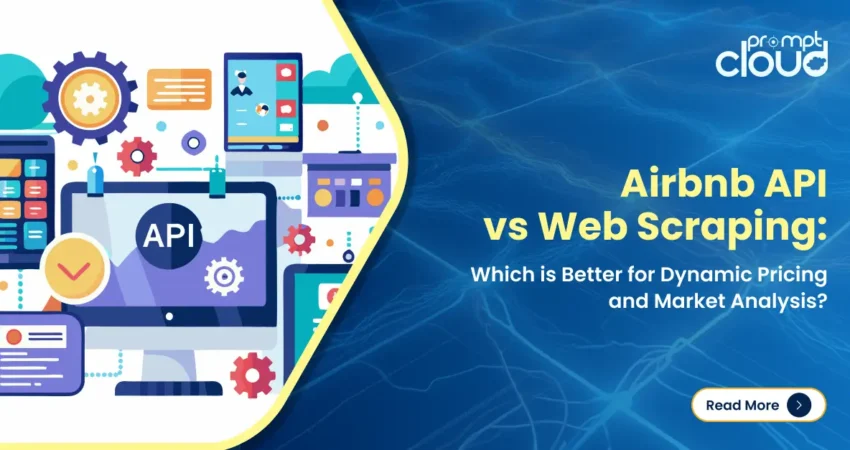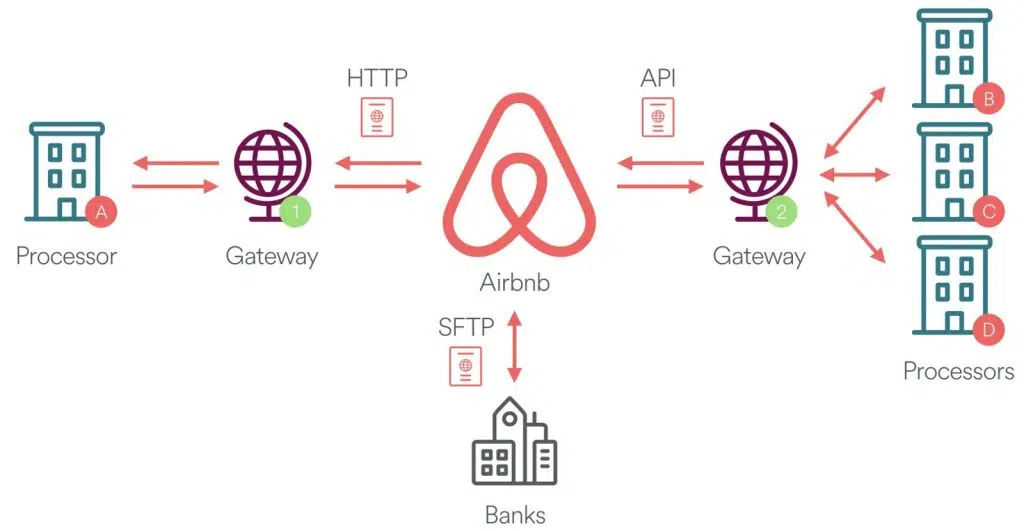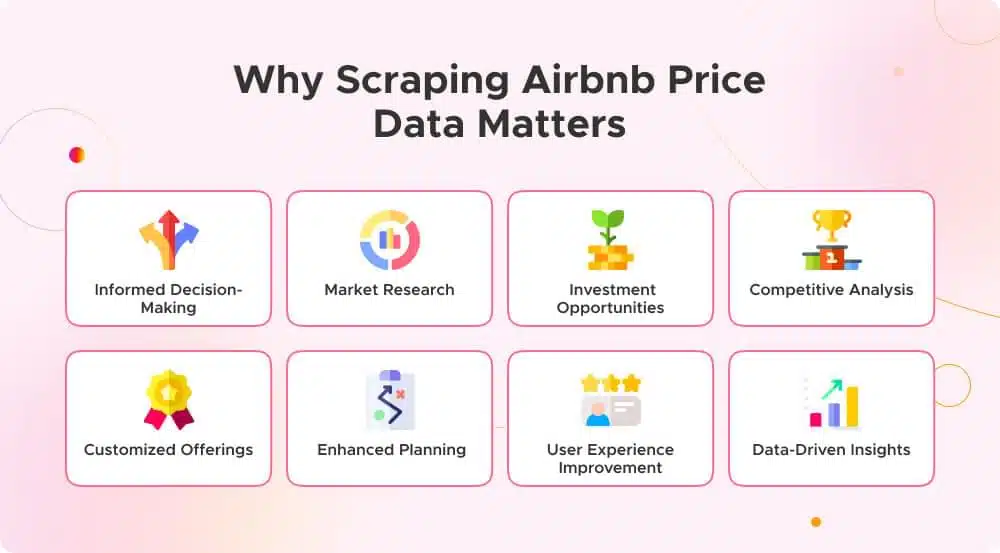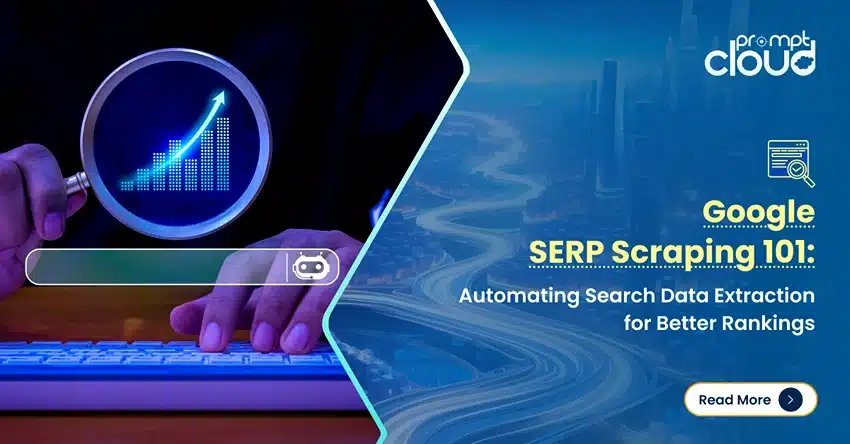
The vacation rental industry, led by platforms like Airbnb, has seen exponential growth over the past decade. With the increasing popularity of short-term rentals, competition among hosts and property managers has also surged, making it critical to adopt data-driven strategies for dynamic pricing and market analysis. To stay ahead of the competition, hosts must continuously monitor market trends, competitor pricing, occupancy rates, and customer preferences.
To achieve this, many hosts and property managers turn to data collection methods like Airbnb’s API and web scraping to gather key insights. While both solutions offer pathways to accessing valuable data, they differ significantly in terms of functionality, scalability, ease of use, and customizability. In this article, we’ll explore the differences between using the Airbnb API and web scraping for dynamic pricing and market analysis, helping you choose the best approach for your needs.
How Data Powers Dynamic Pricing and Market Analysis?
Before diving into the comparison between the Airbnb data API and web scraping, it’s important to understand why data is so crucial for hosts on platforms like Airbnb. For property managers to succeed in a highly competitive market, having access to real-time, accurate data allows them to adjust their pricing strategies, optimize occupancy rates, and make informed decisions about property management.
Some of the key data points needed for dynamic pricing and market analysis include:
- Competitor Pricing:
Monitoring how other hosts price their properties helps you set competitive rates and adapt to seasonal fluctuations.
- Occupancy Rates:
Understanding how full or vacant properties are in a given area allows you to identify market demand and optimize booking windows.
- Market Trends:
Tracking trends such as seasonal changes, events, or shifting traveler preferences helps you adjust your marketing and pricing strategies.
- Customer Reviews and Ratings:
Analyzing guest feedback can provide insight into property strengths, weaknesses, and opportunities for improvement.
With real-time data, property managers can leverage dynamic pricing algorithms, adjusting prices based on market demand and availability to maximize revenue. This is where the Airbnb API and web scraping come into play as data collection tools.
What is the Airbnb API?

Source: https://www.zibtek.com/
The Airbnb API is a programmatic interface that allows developers to access certain data and functionalities on the Airbnb platform. It’s typically used by property management companies, booking platforms, and third-party tools that provide analytics or dynamic pricing solutions. The Airbnb API allows users to access structured data from the platform without needing to manually navigate the website.
Key Features of the Airbnb API:
- Availability Data: Access to property availability calendars, enabling property managers to see when listings are booked or vacant.
- Reservation Management: Ability to manage reservations, synchronize calendars, and update listing information programmatically.
- Basic Listing Data: Access to certain listing data, including pricing, amenities, and property descriptions.
- Booking History: Historical booking data, allowing property managers to track previous occupancy and pricing patterns.
However, the Airbnb data API is designed with certain limitations. Not all data is available through the API, and access is typically restricted to registered partners or businesses. Additionally, some features, like competitor pricing data or comprehensive market analysis tools, are limited or not available at all. This is where web scraping offers a more flexible alternative.
Web Scraping: A Comprehensive Data Collection Solution
Web scraping is the process of automatically extracting data from websites by parsing HTML and other web elements. For property managers and hosts looking to gather a wide range of data points from Airbnb, web scraping offers more flexibility and customization than the API alone. With web scraping, users can collect data that may not be readily available through the Airbnb API, such as competitor pricing, property reviews, and detailed market trends.
Advantages of Web Scraping for Airbnb Data:

Source: crawlbase
- Customizable Data Collection: Web scraping allows users to extract virtually any data available on the Airbnb platform, including competitor pricing, customer reviews, ratings, photos, and detailed listing descriptions.
- Real-Time Monitoring: Unlike the API, which may have rate limits or restricted access, web scraping allows users to monitor the market in real time, gathering data at intervals that match their dynamic pricing needs.
- Comprehensive Market Analysis: By scraping multiple properties in a specific geographic area, property managers can gain a complete understanding of the local market, including occupancy trends, pricing fluctuations, and guest preferences.
- Competitor Insights: Web scraping enables users to track competitor listings, including changes in pricing, amenities offered, and booking patterns, providing actionable insights for adjusting your strategy.
However, web scraping comes with its own challenges. Websites often implement anti-scraping measures such as CAPTCHA, rate limiting, or IP blocking to prevent automated data collection. Managing these obstacles requires technical expertise and a robust scraping infrastructure, making it necessary for some users to partner with a web scraping service provider like PromptCloud.
What are the Key Differences between Airbnb API vs. Web Scraping?
To understand which solution is better for your needs, let’s break down the key differences between the Airbnb API and web scraping when it comes to dynamic pricing and market analysis:
1. Data Availability and Access
- Airbnb API: While the Airbnb API provides structured and clean data, it has limitations regarding the types of data available. It primarily offers access to availability data, booking history, and listing management functionalities. However, competitor pricing, market trends, and guest reviews are generally not accessible through the API.
- Web Scraping: Web scraping allows users to extract a wider range of data points from Airbnb’s website. This includes competitor pricing, property reviews, detailed amenities, and more. If you need comprehensive data for market analysis, web scraping provides greater flexibility.
2. Customization and Flexibility
- Airbnb API: The API is useful for businesses that want to integrate Airbnb data into their platforms for specific functions like reservation management or availability synchronization. However, it lacks customization when it comes to accessing specific data points for dynamic pricing or market analysis.
- Web Scraping: Web scraping is highly customizable. Users can tailor the scraping process to target specific listings, regions, or data points that are most relevant to their business needs. For property managers focused on dynamic pricing or competitive analysis, this customization is invaluable.
3. Ease of Use and Setup
- Airbnb API: Setting up the Airbnb API requires a developer to integrate the API into existing systems. Access to the API is typically granted to registered partners, and there are limits on the number of API calls that can be made, which can slow down data collection for larger businesses.
- Web Scraping: Web scraping requires more technical expertise to set up and maintain, particularly when dealing with anti-scraping measures like CAPTCHA or IP blocking. However, businesses can opt to use fully managed web scraping solutions from providers like PromptCloud, which handle these challenges while delivering clean, structured data.
4. Real-Time Data Collection
- Airbnb API: While the Airbnb API provides some real-time data, it may not always be sufficient for hosts who need to monitor competitor pricing or market conditions frequently. There may also be rate limits that restrict the frequency of data retrieval.
- Web Scraping: Web scraping is ideal for real-time data collection because it can be customized to pull data at any interval. Whether you need hourly updates on competitor pricing or daily reports on market trends, web scraping offers unmatched flexibility.
5. Compliance and Terms of Service
- Airbnb API: The API is fully compliant with Airbnb’s terms of service, making it a safe and reliable way to integrate Airbnb data into your business without legal concerns.
- Web Scraping: While web scraping offers greater flexibility, it’s important to ensure compliance with Airbnb’s terms of service and legal guidelines. Ethical scraping practices and adherence to robots.txt files are necessary to avoid potential issues.
Choosing the Best Option for Dynamic Pricing and Market Analysis
When deciding between the Airbnb API and web scraping for your dynamic pricing and market analysis needs, the right solution depends on your specific goals and technical capabilities.
When to Use the Airbnb API:
- You need structured, easily accessible data for tasks like reservation management, availability tracking, and basic listing data.
- Your business is an approved Airbnb partner or developer and can benefit from direct API integration.
- You do not need extensive competitor or market trend data and prefer an easy-to-implement solution.
When to Use Web Scraping:
- You require comprehensive data for dynamic pricing, competitor analysis, and market trend monitoring, beyond what the API offers.
- Your focus is on real-time insights and detailed property data, including reviews, pricing, and amenities across various regions.
- You need a customizable solution that allows you to extract data from multiple sources or adjust scraping intervals based on your pricing strategies.
For property managers and hosts looking for a more comprehensive view of the Airbnb market, web scraping provides unmatched data access and flexibility. It enables businesses to monitor market trends, track competitor activity, and adjust pricing strategies with real-time data.
How PromptCloud Can Help with Web Scraping for Airbnb Data
If web scraping sounds like the right solution for your business, working with a professional web scraping provider like PromptCloud can make the process seamless. At PromptCloud, we specialize in fully managed web scraping services, delivering clean, structured data tailored to your specific needs.Whether you’re looking to track competitor pricing, monitor occupancy rates, or gain deeper insights into market trends, PromptCloud’s scraping solutions provide the data you need for smarter decision-making and optimized pricing strategies. Schedule a demo today!


















